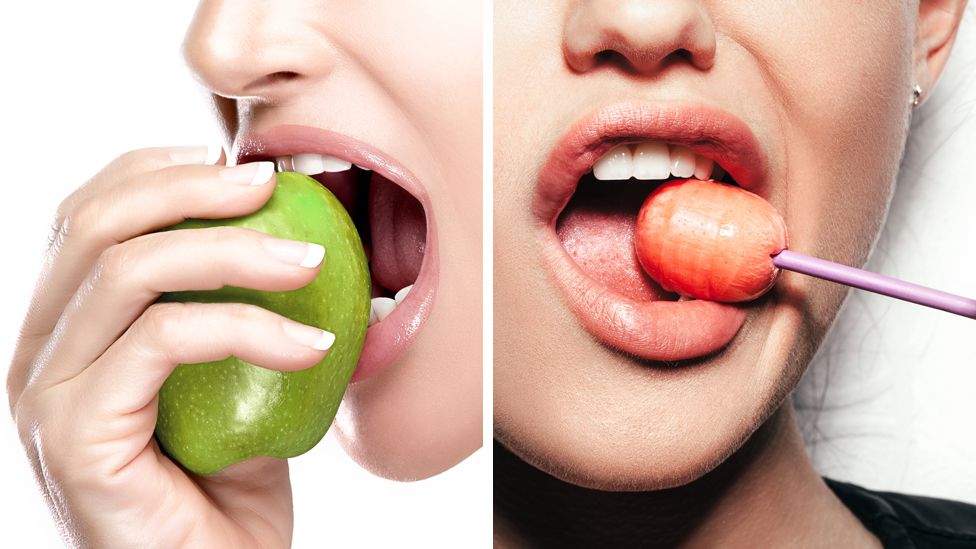Making sure you get the right type of calorie
- Published
- comments

The British Nutrition Foundation is launching a concept called the "quality calorie", to make people think more about the types of foods they eat.
While most adults consume more than they need, simply counting calories and cutting down is not enough, it says.
It wants people to look at nutritional values to select the best calories.
Public Health England said excess calories were the root cause of obesity and tackling the issue was a priority.
Calories give people energy - women need about 2,000 a day and men 2,500.
Public Health England suggests:
- 400 at breakfast
- 600 at lunch
- 600 at dinner
- leaving room for a couple of healthy drinks and snacks
Food packaging will tell you how many calories (kcal) the contents have - but working out the healthiest choice can be trickier.
- A 30g handful of nuts contains about 174kcal, similar to a couple of chocolate digestives, but the British Nutrition Foundation (BNF) says nuts are quality calories, making them a good snack, while the biscuits are not
- An avocado contains lots of good nutrients even though it has more calorific value than many other fresh fruits and vegetables, making its calories "quality" too
- A low calorie beer is not nutritious
High v low
High-calorie foods are often less healthy but not always. And those sold as low-calorie may not be the healthiest.
Low-calorie means:
- 40 calories or less per serving if it is a food
- 20kcal per 100ml if it is a drink
'Zero' calories
Manufacturers are allowed to say their food is calorie-free if a serving has fewer than five calories - but these still count.
- A can of diet "zero" fizzy drink contains about 10kcal - the same as a small (30g) carrot. The carrot has the quality calories, while the fizzy drink doesn't
Empty calories
Experts often refer to alcohol - but any food or drink high in sugar but low in nutritional value can be said to have empty calories.
- A lollipop can contain about 45kcal, only slightly more than an apple - but these calories are empty, while the ones from an apple are quality
Hidden calories
When people say hidden calories, they mean foods or drinks higher in calories than most people might expect.
- A 125g pot of low-fat fruit yogurt can contain more than 100kcals - more than a chocolate-covered digestive biscuit. A plain yogurt with a few berries or a sprinkle of low-sugar granola would be a better quality calorie choice, says the BNF
Dining out calories
About a quarter of calories now come from food and drink consumed outside of the home, according to government research.
Increasingly, cafes, coffee shops and restaurants are making calorie information more visible. But it can still be difficult to keep track, especially if you add extra ingredients and flavours to your purchase.
- A regular latte coffee (made with semi-skimmed milk) contains about 78kcal. Add some vanilla syrup, and you'll have more than doubled it to about 175kcal without gaining any quality calories
Getting it right
According to Public Health England, a healthy diet should include:
- lots of fruit and vegetables
- some starchy foods such as wholegrain bread, pasta and rice
- some protein from meat, fish, dairy or pulses
- a bit of fat
Things to cut down on are:
- sugary fizzy drinks
- alcoholic drinks
- sugary breakfast cereals
- cakes
- biscuits
- pastries
A body mass index calculator can help you judge if you are a healthy weight or not.
If you do need to lose weight, NHS Choices says aim to lose about 0.5-1kg (1-2lb) a week by consuming about 500-600kcal fewer a day than you need.
Dr Alison Tedstone, chief nutritionist at PHE, said: "We clearly need to improve the nation's diet but excess calories are the root cause of obesity - this is why we are working with the food industry to reduce sugar and calories in everyday foods."
Dr Frankie Phillips, from the British Dietetics Association, said: "If you are eating too many calories, then you need to be cutting down but also making sure the ones you are consuming count for more in terms of nutrition. It's about getting value for your calories.
"Focusing on just one nutrient, like cutting down on only fat or sugar or calories, runs the risk of missing out on crucial nutrients."
- Published19 September 2018
- Published19 February 2018
- Published3 January 2018
- Published28 April 2018